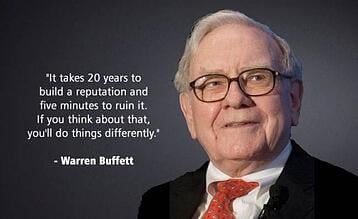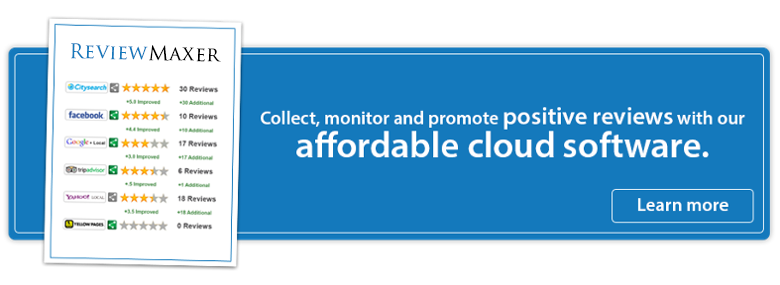Bring more customers to your company with a better reputation
Warren Buffett said it best:
 A company’s reputation is one of its most important tools online – every website has ratings and feedback sections. Obviously, too many “1-star” reviews on a giant online retailer like Amazon can doom a product. It’s important to remember that while there are many indicators of online reputation, one of the most important consumer indicators may be the Better Business Bureau (BBB).
A company’s reputation is one of its most important tools online – every website has ratings and feedback sections. Obviously, too many “1-star” reviews on a giant online retailer like Amazon can doom a product. It’s important to remember that while there are many indicators of online reputation, one of the most important consumer indicators may be the Better Business Bureau (BBB).
What is the Better Business Bureau?
The BBB is a nonprofit organization that focuses on marketplace trust. It consists of 106 independently owned incorporated local BBB organizations in the United States and Canada, overseen by the Council of Better Business Bureaus, which is based in Arlington, Virginia. The BBB defines this “marketplace trust” as comprising of two factors: integrity and performance. It describes integrity as ethics, respect and intent. It defines performance by the quality of products and services, as well as the speed and standard of their delivery. The BBB grades companies on these factors with a rating system that goes from “A+” to “F,” although “NR” (No Rating) is possible if insufficient data is available.
The BBB is not a government agency, so businesses are not actually forced to comply with it – and many choose not to because of industry self-regulation. Worth noting, though, is that businesses can be paying members of the BBB. The link between paid memberships and higher ratings has led to claims such as those asserting that companies can’t get an “A” rating without being paid members, which the BBB contests. In 2010, the BBB came under fire because the Ritz Carlton, a world-famous five-star hotel, received an “F” rating after refusing to pay for a membership after having only two complaints out of more than a million customers served.
Regardless of the possible pay-to-play scheme, the BBB is respected by the average consumer, and it’s a good idea to earn and retain as high a rating as possible.
How can a company raise its rating, excluding buying a BBB membership?
1. Reduce the number of complaints
While there are many factors that contribute to your BBB rating, the biggest influencer is the number of complaints the BBB receives about your company. Whether your company has 10 customers or 10,000, having fewer complaints is obviously the best plan of attack. Set up a system that ensures prompt customer service and delivery of products or services. A great proactive stance can solve problems before they ever get on the Internet or to the BBB.
2. Cooperate
One of the more important things a company can do is to work with the BBB. The BBB likes fast responses to complaints and harshly penalizes companies that don’t work to resolve those complaints. It is entirely possible that your company has complaints and you didn’t know it. The BBB is actually penalizing some companies that don’t even know what the BBB is. Regardless, those companies are potentially losing sales because of their bad online reputations. When the BBB wants to have an investigator look into your company, do your best to help him or her. Most important, never lie or hide the truth about things like total customers. Always remember that the BBB controls the rating your company gets.
3. Self-audit
Another way to improve your score is to audit your company regularly. Making sure that product descriptions are complete, that estimated delivery times are accurate and that return and warranty policies are carried out without hassle to the customers can go a long way. Failure to manage little things like these lead to most of the complaints that companies receive. Most people inherently want to enjoy their purchases and not have to complain; bad service and shoddy products push them to go onto the Internet to voice their dissatisfaction.
Online reputation is everything to companies that operate online. The truth is that while paying for a membership may raise or ease your company’s rating, the best solution is to just treat the customers like they’re important and follow good practices. If things go wrong, deal with them quickly and effectively.
If you’re interested in improving your BBB rating and company reputation, call us at Axia Public Relations and we’ll help you get started. Companies struggling with their reputations can also download our reputation e-book, “Online Reputation Management.”
4. Use review management software
Most of our clients use ReviewMaxer for online review management. ReviewMaxer is a simple, easy-to-use tool that allows you to monitor, gather and promote positive online customer reviews. ReviewMaxer users see an increased average star rating, better SEO and improved online reputation within 60 days.
In the interests of full disclosure, Axia Public Relations is not a member of the BBB because we work with corporations as clients – not consumers. This article is based on testimonials from online research and companies that we have worked with over the years that have interacted with the BBB.
Conclusion
In conclusion, dealing with the Better Business Bureau is tricky. It's a money-making, for-profit enterprise. It benefits from selling corporate memberships and is surrounded by some controversy among businesses who feel targeted by the organization. The BBB bases its rating on a ratio or perceived ratio of your company's customer complaints to your company's number of customers. While you should never exaggerate the number of customers your company has, you also should be careful not to under report that number either. Consider counting all previous and current customers, if that's allowed. Good communication with the BBB, remaining objective, factual and sympathizing with the BBB and the consumer's position during a complaint investigation, as well as possibly becoming an accredited member may help you improve your BBB rating.
Has your company had problems involving the BBB? Have you figured out any methods to improve its rating? We would love to read about your experiences in the comments. Please share below.
 Jason Mudd is CEO of Axia Public Relations, a national PR firm. He is an Emmy Award-winning, accredited public relations practitioner, speaker, author and entrepreneur. His public relations portfolio includes work for American Airlines, Budweiser, Dave & Buster’s, H&R Block, Hilton, HP, Miller Lite, New York Life, Pizza Hut, Southern Comfort, Verizon and more.
Jason Mudd is CEO of Axia Public Relations, a national PR firm. He is an Emmy Award-winning, accredited public relations practitioner, speaker, author and entrepreneur. His public relations portfolio includes work for American Airlines, Budweiser, Dave & Buster’s, H&R Block, Hilton, HP, Miller Lite, New York Life, Pizza Hut, Southern Comfort, Verizon and more.
Topics: public relations, PR tips, reputation management, online reputation management



Comment on This Article